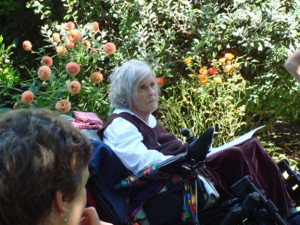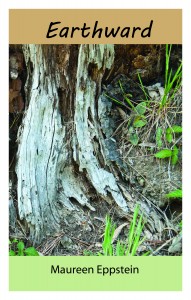Posts Tagged ‘Earthward’
Going Dark
In 1966, my friend Diana Neutze developed multiple sclerosis (MS). She was not yet thirty years old.
I first met Diana about ten years before this, when we shared English Lit. classes as freshmen at Canterbury University in Christchurch, New Zealand. During school breaks we worked as kitchen hands at the same remote fishing camp. I was part of her wedding, and she of mine. We lived next-door to each other as young marrieds, and shared survival tips as penniless expatriate mothers of small children in London. Even after I moved to California and she returned to New Zealand, we stayed in touch as best we could.
For decades Diana’s illness came and went. She learned to live with it, devising ingenious stratagems for making sure she stayed mobile and independent. Whenever possible, she refused medications. All she had left, she said, was her mind, and her ability to find joy in music and the beauty of her garden. Painkillers took that clarity of mind from her, and this she could not allow. Right up until the end she was writing and publishing poetry. (I reviewed a recent book in these pages) I introduced her, via email, to a quadriplegic friend who got her started with voice recognition software. When she could no longer edit using one finger on a keyboard, or see to read, she dictated edits to a carer.
Diana and I traded poems and, as her body slowly but inexorably closed down, thoughts about death. She was in my mind when Gallery Bookshop in Mendocino invited local poets to respond to Wendell Berry’s poem “Going Dark” at a 2012 Winter Solstice event. I sent the poem to Diana, and included it in my new chapbook, Earthward. When I spoke to Diana via Skype in April 2013, three days before she died, she accepted my promise to dedicate Earthward, to her memory. At her request, my poem, “Going Dark,” was read at her funeral. Here it is:
Going Dark
To go in the dark with a light is to know the light.
To know the dark, go dark. Go without sight,
and find that the dark, too, blooms and sings,
and is traveled by dark feet and dark wings.
— Wendell Berry
My friend’s body is a brown leaf,
shriveled and curled inward.
Pain is a constant, yet
the fierce flame of her will
refuses surrender.
It’s not death’s darkness she resists
but the loss of a self transfixed
by what is beautiful:
a Bach air, the light
through her walnut tree.
This dark she speaks of
has no scent of earth,
no draft from unseen wings,
no sudden rustle in the undergrowth.
What can I say to her, and to myself,
this season of gathering in
our lives against the rainy dark,
against the ancient fear
that light will not return?
Just this: a dry leaf
fallen to ground disintegrates,
becomes the food that nourishes
all that sweetly blooms and sings.
My chapbook Earthward is available from Finishing Line Press. The direct link is: https://finishinglinepress.com/product_info.php?cPath=4&products_id=2129
Some of Diana Neutze’s poems can be read on her blog site, Living With Multiple Sclerosis.
My new poetry collection
I am excited to announce that Finishing Line Press is now taking pre-publication orders for my new poetry collection, Earthward. It can be ordered now and will be printed and shipped in October. You can order online from the publisher at https://finishinglinepress.com/product_info.php?cPath=4&products_id=2129
The cost is $14 plus $2.99 shipping. The publisher bases the size of the print run on how many pre-publication orders they receive, so I hope you’ll consider adding to my tally. Please feel free to suggest this book to others you think might be interested too.
The poems in Earthward explore the cyclical patterns of life. Here is a sample poem:
Osprey With Fish
Undercarriage of leg and talon
joins two bodies similar
in sleekness,
twinned
as life and death conjoin
in a continuum
of nourishment.
Huge wings slow over forest,
a fading cry.
I’ve been honored to receive reviews from poets I admire:
With a naturalist’s eye for the precise and sensuous image and a writer’s care for the precise and sensuous word, Maureen Eppstein plants our human griefs into this book, roots them, and invites them to quicken into new life.
—Jane Hirshfield, author of Come, Thief
What captivates me about Earthward is the way Maureen Eppstein transforms ordinary landscapes into miraculous acts of affirmation. Turning compost becomes an opportunity to ponder death and resurrection, braiding garlic reminds us of the “pleasure taken in braiding the hair of the beloved”. This is poetry of quiet lyrical depth, that reconnects us with land and spirit. Earthward invites us to stand deeply rooted in each moment, “in awe and wild surmise at all this human brain can not yet comprehend.”
—Devreaux Baker, author of Red Willow People
In Earthward, Maureen Eppstein unites what would break us with what will bring us back to life. The wild ones, like us, must eat, and so kill. Lost sisters are mourned by proxy. Some things we love are transplanted and transplanted again, surviving and sometimes thriving. The tenacity Eppstein describes is the foundation of our lives. There are those who say that to write about the extraordinary one must look lovingly at the ordinary. Eppstein knows where, and how, to look.
—Camille T. Dungy, author of Smith Blue
Here’s a brief bio:
Maureen Eppstein is the author of two previous poetry collection: Rogue Wave at Glass Beach (2009) and Quickening (2007), both published by March Street Press. Quickening was also first runner-up in the 2007 Finishing Line Press/ New Women’s Voices competition. She has been a finalist in several other book contests. Her poetry has appeared in numerous journals and anthologies, including Poecology, Calyx, Basalt, Written River, Sand Hill Review, and Aesthetica 2014, and has been nominated for a Pushcart Prize. Crossing the boundary between the arts and the sciences, her poems have been included in a textbook on computer graphics and geometric modeling and used in a university-level geology course.

